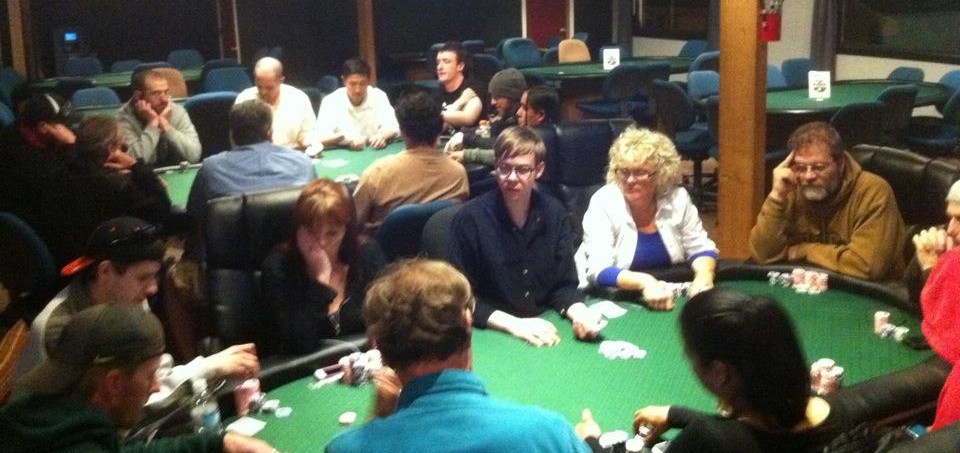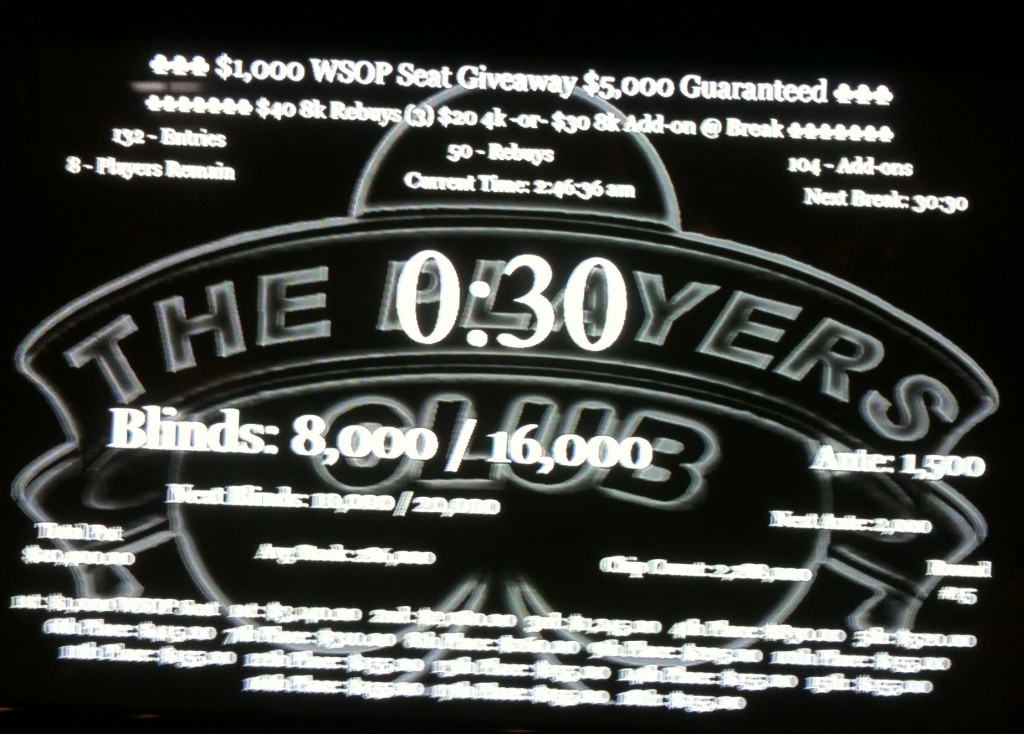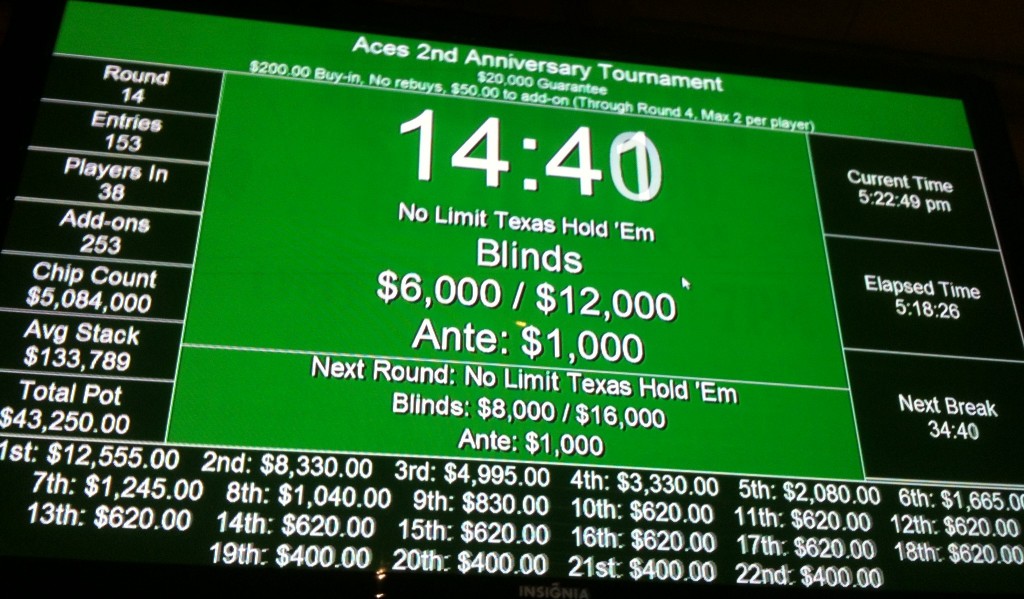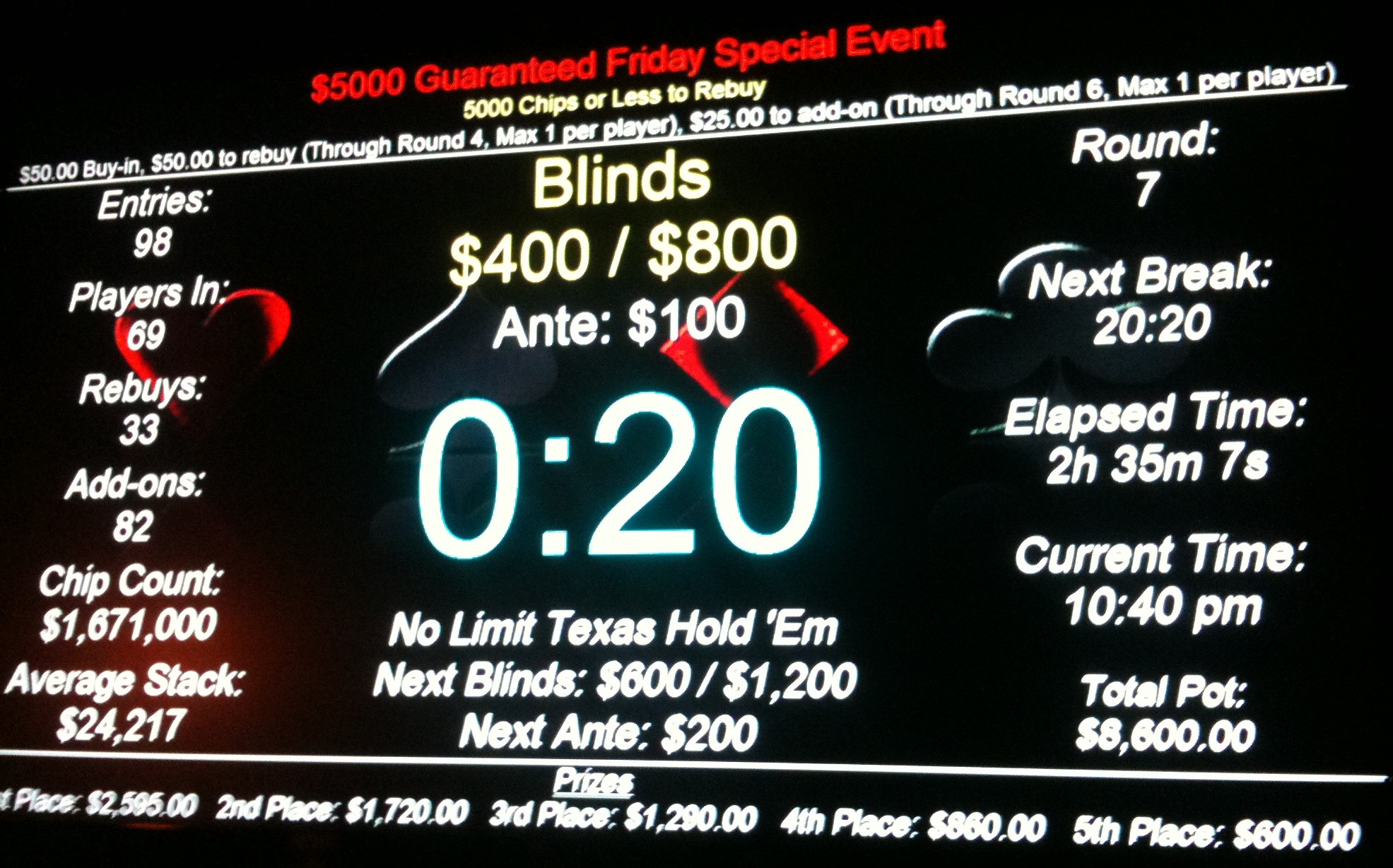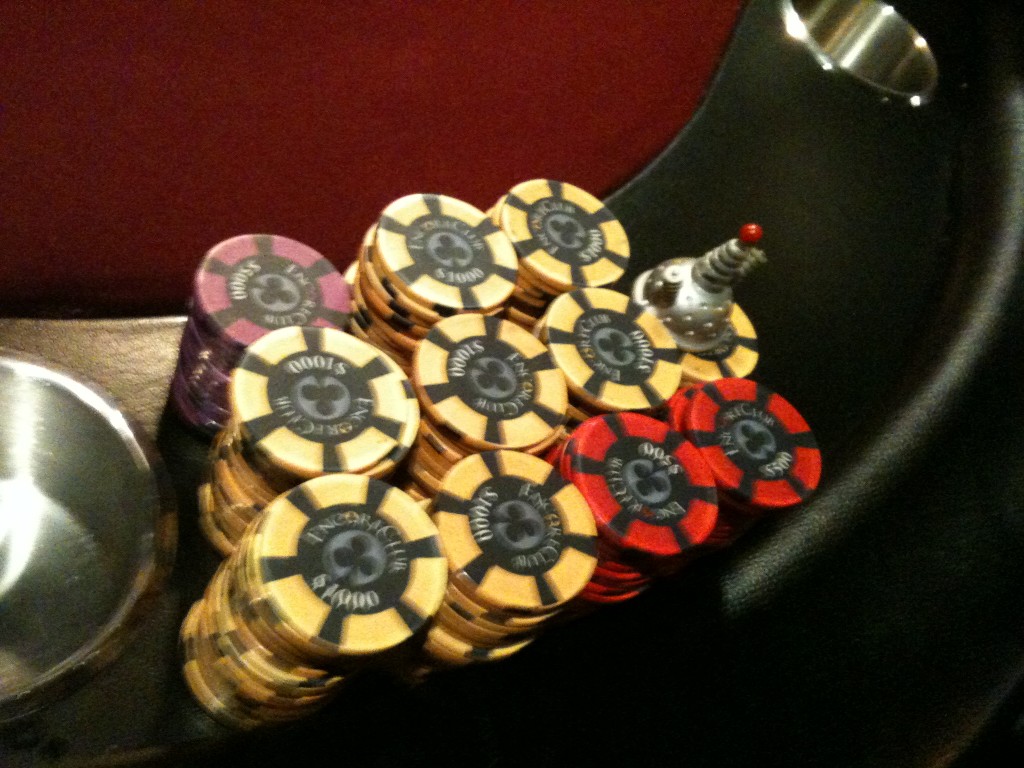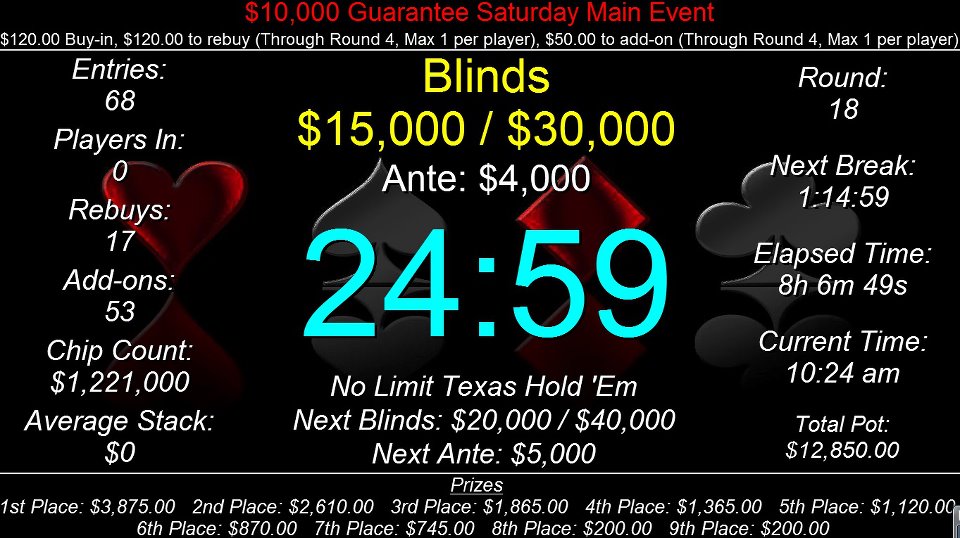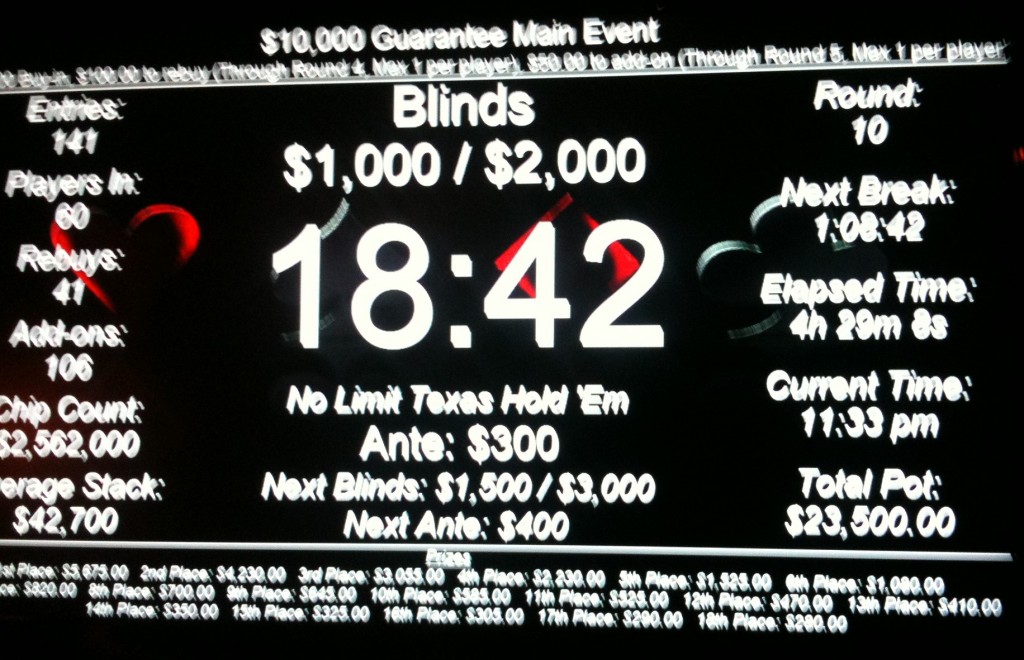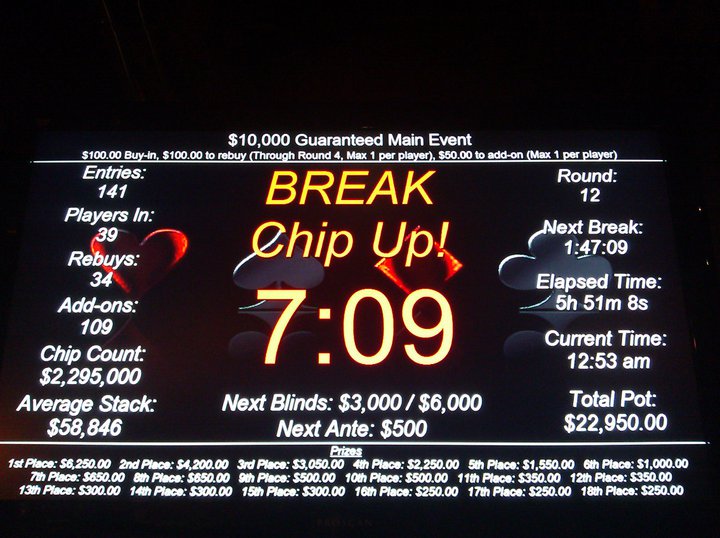Big tournaments in Portland poker over the next couple of weeks, with both Aces Players Club and The Final Table celebrating anniversaries, and a general gearing-up of the community for the upcoming summer series.
Portland Players Club WSOP Seat $5,000 Guarantee (8,000 chips)
I got off to a very hot start Friday night, sitting down a couple of hands in, picking up [ax ax] on my second hand, then going up against a player who sat at seat 2 a couple minutes after me. I’d picked up a premium [qx qx] and raised with nothing higher than a nine on the flop and we both put more money in. Another queen hit on the turn and he shoved, getting a call from me. A seven on the river made a set for his [7x 7x] but my set of queens held—with a river queen putting me on the high hand board—and he re-bought after his first hand. Funny story about that.
Fifty minutes into the game, and I was up to 22,400, more than three times the starting stack. Then I lost 1,900 in a couple calls with [9h th] and [kx qx]. I knocked out one of the PPC regulars with a [3x 7x] in SB when I caught a little of the [3x 2x 6x] flop. G thought he was safe with his [4x 4x], and he was through the [2x] on the turn, but the river [7x] sealed his fate and he re-bought. Ninety minutes in and I was at 25,750.
I made it as high as 29,400 before the first break, but I called an all-in on a flop of [ad 4d] with [2d 5d] against [4x 4x] and failed to catch another diamond, so I only had 21,900 before the T8,000 add-on.
I kept up my occasional calls with low suited gaps but lost 1,500 calling pre-flop as BB with [3s 6s] and another 600 as SB with [2h 6h].
About three hours in, I doubled up with a set of sixes against one of the larger stacks, putting me at 52,935, with the chip average at about 22,000.
[8x 8x] held up against an all-in from a very short stack holding [ax 9x], making up for losses to blinds and antes; I was at 52,000 even after the chip-up on the next break. There were 93 of 132 entries remaining after three-and-a-half hours, with 50 re-buys and 104 add-ons.
Half-an-hour later, with blinds up at 400/800/100, the number of players had dropped to 78. The average stack was 29,333: 36BB or (since we were 10-handed) an M-ratio of just 13, already in Dan Harrington’s “yellow zone” where small suited connectors and pairs lose value. I was sitting on 63,900 ten minutes after the top of the hour, when the average was 30,506.
I raised with the heart version of the Mutant Jack and took down the blinds and antes without a fight, then finally knocked out G with [qx jx] when I made two pair.
At the next break, four-and-a-half hours in, I had 86,600 (34,149 average) with 67 players left. Just 49 to go before the money.
I lost a big chunk of ground calling an all-in with [jh qh] against [kx jx]. The board nearly gave me both a flush and a straight, but the better hand held out. Five-and-a-quarter hours in to the game, I was at 66,500, with the average creeping up under me to 40,140.
Then I hit the high hand board again when [kx kx] made quads (with an ace kicker), knocking out another player and putting me up to 97,000.
[7d 9d] took in a lot of chips , hitting two pair on the flop and a full house on the turn. When the clock struck midnight after six hours of play, I had 142,300, not quite three times the 52,000 average, with 40 players left.
The spade Mutant Jack ([As Js]) failed me against [9x 9x], and I lost 30,000 chips about twenty minutes later, then I shoved over two raises with [tx tx] to take the pot and managed to pull myself back up to 124,500 (average 65,700) just before the middle of the seventh hour. Blinds were 2,000/4,000/500; there were 35 players left.
Just after the half-hour, I lost calling an all-in with [qx qx] against [9x 9x] when the nine showed on the flop, taking me down 26,600.
Just ten minutes later, nines almost did me in again when I had [ax qx]. She made a set on the turn but a [tx] on the river made me Broadway and I knocked out another player.
Playing [kd td] from SB, I lost 8,500 to see the flop. Everyone checked the turn but I couldn’t pay the 8,000 to see if there was a jack on the river and the board was too clubby for me.
The next break was at the end of seven hours of play, and I had 139,000. We were down to three tables (exactly 27 players), with the average stack at 84,740 and blinds going up to 3,000/6,000/500 (14BB, M-ratio of 6; mine was a paltry ten). With those kinds of numbers, the winnowing was taking place pretty fast. The money bubble was burst in just twenty minutes.
I hadn’t found any opportunities to build up, however, and my stack had slipped to 110,500, with the chip average finally overtaking me to 127,111.
I blew 31,000 with [qd 8d] going up against [ax 8x] and ten minutes after making the money I was down to just 75,500. I shoved with [kx jx] and won the blinds and a call, then went all-in again with [ks qs] half-an-hour later, just before the blinds went up to 8,000/16,000/2.000.
There were 13 players left. My table had six players—so the blinds were coming around rather quickly—and there were a couple of very big stacks, including the guy I’d knocked out with quad queens back on his first hand. I had 87,500.
Half-an hour later, I was still alive as the final table was made. Three of the players were original players at my starting table. I was the second-shortest stack at the table. I shoved with roughly a quarter of my stack in the pot as BB on the first hand—I didn’t record what with—and was beat.
The first-place winner was the guy I took out with quad queens on his first hand.
Eight hours and forty-five minutes. +193% ROI. 9th of 132 entries.
Aces Players Club 2nd Anniversary $20,000 Guarantee Freezeout (20,000 chips)
This was the big-money game of the weekend. Running at full capacity and with people buying in after bustouts, there was no way the prize pool for this event wasn’t going to swell far beyond the guarantee (the PPC event prize pool was twice the guarantee itself). I bought the 8,000 chip preliminary add-on, so like most players, I was starting with 28,000 chips.
I laid low for the first fifteen minutes, picking up [7x 7x] as UTG1. I lost about 1,000 when a player with an ace made a pair on the turn and I bowed out.
[6s ts] gave me the inclination to raise, and I sort of liked the [qx 9x 8x] flop, but [ax] and [2x] on the turn and river left me cold and [qx tx] won the hand.
Lost some more with King Salmon ([Ks 7s]) when I paired my seven on the flop but the turn brought in a flush possibility for my opponent and I folded.
Called 800 from SB with [kx jx] but folded to a raise to 5,000.
Forty minutes in and I hadn’t won anything and was down to 23,475.
On the last hand before the first break, I called a pre-flop raise to 1,200 with [qh 9h] and caught an open-ended straight flush on the flop of [th jh 5x]. I brazenly shoved after a [5x] on the turn and everyone folded.
With the 8,000 extra add-on, I started the next session with 42,200, up a little over 6,000 from what I’d bought in for.
With [ax kx] in the SB and a [kx tx tx] flop, I folded with 7,500 in the pot to a 40,000+ all-in bet. Another player called and the winner was [ax tx] over [7x tx].
I stayed pretty quiet through the next half-hour; at the ninety minute mark I hadn’t won any more but I was still holding at 40,300. The final stats were in for the game: 153 entries, 148 players still in, 253 add-ons (both pre-game and at break), and a total pot of $43,250.
I knocked out a player playing with [3s 6s]. I hit bottom pair and a flush draw on the flop and called his all-in of 9,000. He showed [kx qx] for a higher pair but my flush card came on the turn.
Ten minutes later, I had [8x 8x] on BTN and raised, getting re-raised by BB. I called and we saw a flop of [qx 7x 2x]. I put him on [ax kx], which was a big mistake, and I shoved to give the impression I’d hit a set, but he had [kx kx] and I was out 41,200 chips, leaving me with just 13,500. This was the mistake that probably kept me out of the money in this tournament.
Fifteen minutes later, that had dwindled to 6,900. I went into cornered wolverine mode (again), shoving with [jd td] from CO and winning the blinds. 8,100 chips.
Payouts went up on the board. 22 places were getting money, with the top five prizes initially set at $12,555, $8,330, $4,995, $3,330, and $2,080. Things were getting serious.
I was all-in on two consecutive hands. FIrst with [ks qs]. I was called by [qx jx] and doubled up. Then I shoved [ax jx] over two calls and won with no showdown. People started complaining, but I’d managed to build back up to the starting stack, at least. Average stack was nearly 39,000 chips, though.
On the first hand after the next break, I had [kx kx] in BB and shoved over several calls to take the pot. 21,300 chips with 130 players left.
I picked up a couple of hands with 9Ts and KJo, then the blinds went to 1,000/2,000/200. With only 27,800 (120 players left), I had a critical M-ratio of less than 6. That’s the “red zone.”
All-in again as UTG1 with [ax qx]. At least I was picking up some decent shoving hands. 28,400 chips after going through the blinds.
Three hours into the game, the blinds jumped to 1,200/2,400/300. Another round of blinds and antes and I was down to 22,600 (M-ratio: 3.5). Just 101 players left.
Shoved again with [ax 9x] and took the blinds. The next time they passed through I was down to 23,000.
I finally picked up a significant number of chips in an all-in battle against a shorter stack with [ks js] against his [qx jx]. Three-and-a-half hours in, I had 46,500 (average stack: 60,523).
83 players left ten minutes later.
[8x 8x] failed me again, this time from SB when I called a 15,000 chip all-in against [kx 9x]. The nine hit on the flop. I’d picked up some other chips along the way, though, so I was actually sitting on 26,500.
Just short of four hours in, half the field was gone. Only 72 players remained, with blinds going up to 2,000/4,000/500.
I rode out the blinds again and was down to 36,500 (average 72,628), still securely in the red zone. At the four hour mark, I shoved over a call as UTG2 with [jx tx] and took the pot again. The pot was enough to put me up to 50,000 (65 left, average 78,215).
I shoved as BB over the SB call as my last act at my starting table before I was moved. I got there with 57,500 chips, only 69% of the average stack, and with blinds at 3,000/6,000/500; an M-ratio of 4.2.
My first act at my new seat was on BTN and I shoved with [jd 9d]. The 13,500 chips in the pot from blinds and antes was substantial in comparison with my stack.
Just a couple minutes later, I made an actual bet of 17,000 with [ax qx] and induced folds. I’d worked my way up to 65,500 (50 players left, average stack: 101,680).
The next break began just after I’d gone through the blinds. I had 55,500—barely more than half the average stack—and blinds were going to be starting up at 4,000/8,000/1,000, leaving me with an M-ratio of just 2.6. Again. 49 players left.
The big stack at our table was dominating from the other end. I went all-in over a raise from him with [kx qx] and I still had enough chips to get him to fold. That popped me up to 87,000 (average 105,916) briefly.
I raised to 20K with [as 9s] UTG. BB called. The flop was king-high, there were no spades, and I folded to an all-in.
Another round of blinds took me down to 51,000.
The big stack wasn’t liking my shoves any more than the other table had. I was all-in again against his raise and he folded, saying he had [kx qx]. I (probably mistakenly) flipped over my [kx qx].
43 players left as we approached the five-hour mark. I had 68,000 chips left and needed a double-up badly.
I was playing so tight I folded [qs ts] UTG.
My final hand was against the big stack. He finally called my all-in (this time with [kx jx]) and he had [6x 6x], which held up. I think he probably would have called even if I hadn’t showed on the previous hand.
The call with the eights against the kings was significant. I never made it back up to the chip average after that point, although I managed to stay in play for another three hours plus.
Five hours and fifteen minutes. 38th of 153 players.

